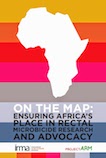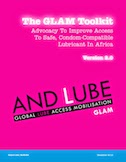top
AVAC, amfar, COC Netherlands and International Rectal Microbicide Advocates (IRMA) are pleased to announce seven Global Lube Access Mobilisation (GLAM) awards to projects in Africa.
 GLAM, an initiative of IRMA’s Project ARM (Africa for Rectal Microbicides) in collaboration with amfAR, AVAC, and COC Netherlands, promotes advocacy in support of increased access to safe, condom-compatible lubricants for all Africans who engage in anal and vaginal intercourse, including GMT (gay men and other men who have sex with men, and transgender individuals) and heterosexual men and women.
GLAM, an initiative of IRMA’s Project ARM (Africa for Rectal Microbicides) in collaboration with amfAR, AVAC, and COC Netherlands, promotes advocacy in support of increased access to safe, condom-compatible lubricants for all Africans who engage in anal and vaginal intercourse, including GMT (gay men and other men who have sex with men, and transgender individuals) and heterosexual men and women.
In response to a request for proposals widely disseminated in February 2014, GLAM partners received 36 proposals representing 17 African countries (Botswana, Cameroun, Côte d’Ivoire, Democratic Republic of Congo, Ghana, Kenya, Lesotho, Malawi, Namibia, Nigeria, Rwanda, South Africa, Tanzania, Togo, Uganda, Zambia and Zimbabwe). A diverse team of 20 advocates and public health professionals with an interest in lubricant access in Africa (from Nigeria, Uganda, Kenya, Zambia, Liberia, South Africa, Rwanda, Benin, Canada, Netherlands and the United States) reviewed the proposals.
Seven projects were selected for funding. These projects began in early July 2014 and will complete their efforts in December 2014. Following is a list of these projects.
Alternatives Cameroun (Douala, Cameroun)
Working in collaboration with other organizations in Douala and Yaoundé, Alternatives Cameroun plans to organize meetings and workshops with health officials and other HIV stakeholders in the country. The meetings and workshops will underscore the importance of providing safe, condom-compatible lubricant as part of comprehensive HIV and STI prevention programming. These activities support the ultimate goal of developing and securing a channel for the distribution of safe, condom-compatible lubricant throughout Cameroun.
Centre for Popular Education and Human Rights (Accra, Ghana)
Centre for Popular Education and Human Rights (CEPEHRG) will campaign to increase access, availability, and use of safe, affordable, condom-compatible lubricant by all who engage in sexual intercourse in Ghana, with special attention given to the LGBT community. The group will call for the inclusion of condom-compatible lubricant in the national essential drug list. Educational and social marketing efforts will take place at the community outreach level and through CEPEHRG’s national advocacy work.
Centre Stage Media Arts Foundation (Bulawayo, Zimbabwe)
Centre Stage Media Arts Foundation (CSMA) will convene policy advisory seminars to engage stakeholders from the Ministry of Health, legislators and members of civil society in support of three goals. One, integrate access to safe, condom-compatible lubricant in the Zimbabwe National HIV/AIDS Strategic Plan. Two, advocate for inclusion of lube as a line item in the national HIV prevention budget. Three, campaign for policy and program changes to allow for the distribution of lube through the same public health distribution channels that condoms are distributed through. A policy brief on the integration of lube access into national HIV prevention policies and programs will be produced. Traditional and social media will be utilized.
Community Health Education Services & Advocacy (Dar es Salaam, Tanzania)
Securing government leadership and commitment to amend the national condom policy and include the provision of safe, condom-compatible lubricant in public health facilities is the chief goal of Community Health Education Services & Advocacy (CHESA). The group will work to build multi-sectorial awareness of the importance of lubricant and will engage the Minister of Health and Social Welfare, health care practitioners, community based organizations, as well as members of the GMT community. The public health message will be “Condom Compatible Lubricant Reduces New HIV Infections.”
Men Against AIDS Youth Group (Kisumu, Kenya)
Men Against AIDS Youth Group (MAAYGO) seeks to increase access to safe, condom-compatible lubricants through several methods. The group will conduct a needs assessment and implement a targeted advocacy campaign in Kisumu County for the GMT community, health care workers, and policy makers. Educational workshops will be conducted with the goal of developing a cadre of lube access advocates who will work to improve government policies and programs. A print/social marketing campaign highlighting the importance of lubricant access in HIV/STI prevention programming will be launched.
New HIV Vaccine and Microbicide Advocacy Society (Lagos, Nigeria)
The strategy New HIV Vaccine and Microbicide Advocacy Society (NHVMAS) will take to improve lubricant access in Nigeria will be to create public demand for these important products for both men and women. Advocacy will be conducted at the state and national levels to promote government investment in lube access. NHVMAS will utilize its listserv, engage the media, and conduct trainings to enhance community awareness of the importance of safe, condom-compatible lubricant in HIV/STI prevention programming.
Partners in Health Research and Development (Thika, Kenya)
The work of Partners in Health Research and Development (PHRD) will seek to improve knowledge of and access to condoms and safe, condom-compatible lubricant among key populations in Kenya. In addition, the group will undertake actions in support of the establishment of a sustainable condom and lubricant delivery system. Sensitisation sessions will be conducted for stakeholders including HIV prevention advocates, civil society coalitions, policy makers, government officials, donors, condom distributors and the media. The inclusion of safe, condom-compatible lubricant in the National Strategic Plan is one of the project’s key projected milestones.
Related materials:
Click here for the GLAM Toolkit in English in French.
The GLAM initiative supported three African projects in 2013. Click here for a GLAM PowerPoint presentation that includes information on these projects.
Click here to access the Project ARM report, On the Map: Ensuring Africa's Place in Rectal Microbicide Research and Advocacy, published in 2012.